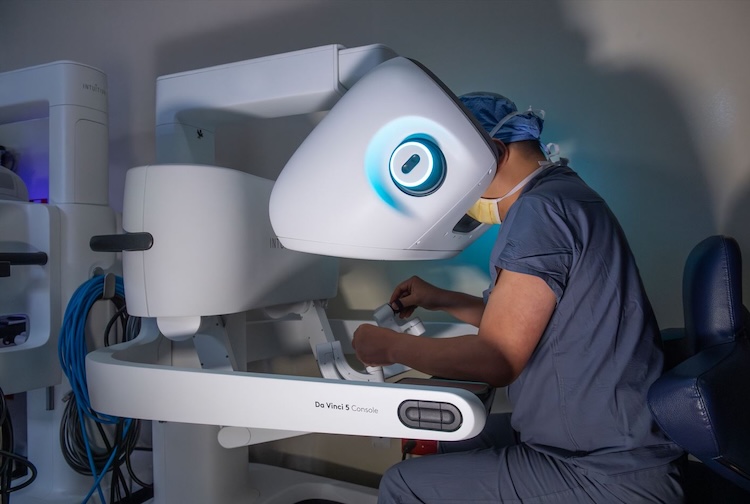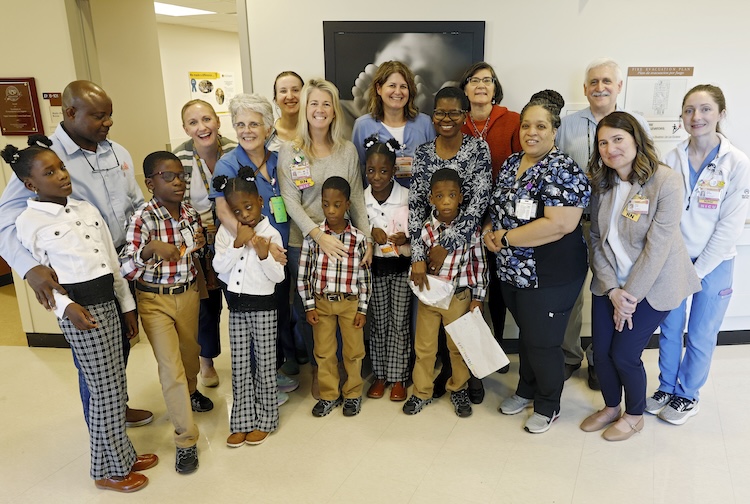Inside VCU Health’s latest innovations in robotic-assisted surgery
Growth and knowledge sharing are two key components of VCU Health’s successful robotics program, according to the surgical chair.
July 28, 2025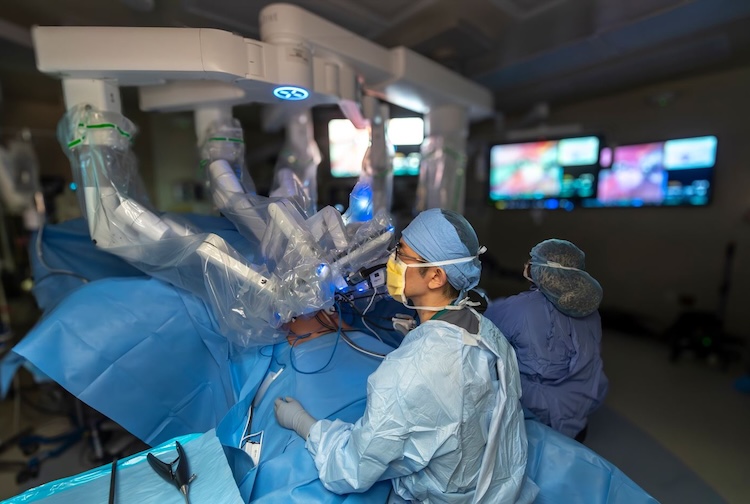 Surgeons from VCU Health Hume-Lee Transplant Center were the first in the country to perform a full robotic living donor liver transplant in early 2025. Yuzuru Sambommatsu, M.D., a transplant surgeon, assisted at the bedside of the robotic-assisted surgery. (Enterprise Marketing and Communications)
Surgeons from VCU Health Hume-Lee Transplant Center were the first in the country to perform a full robotic living donor liver transplant in early 2025. Yuzuru Sambommatsu, M.D., a transplant surgeon, assisted at the bedside of the robotic-assisted surgery. (Enterprise Marketing and Communications)
By Leigh Farmer
Around the world, 14 million minimally invasive robotic surgery procedures have been performed, and more than 76,000 surgeons have been trained in the da Vinci Surgical Systems.
It's hard to believe that this innovation has only been around for 35 years. In 1990, the first FDA-approved surgical robot was introduced by its inventor, Yulun Wang, M.D., from the University of California, Santa Barbara. Named Aesop, the rudimentary robotic endoscope holder responded to the surgeon’s commands while eliminating the natural tremors of a human hand. If asked, it would even compliment the surgeon on a job well done.
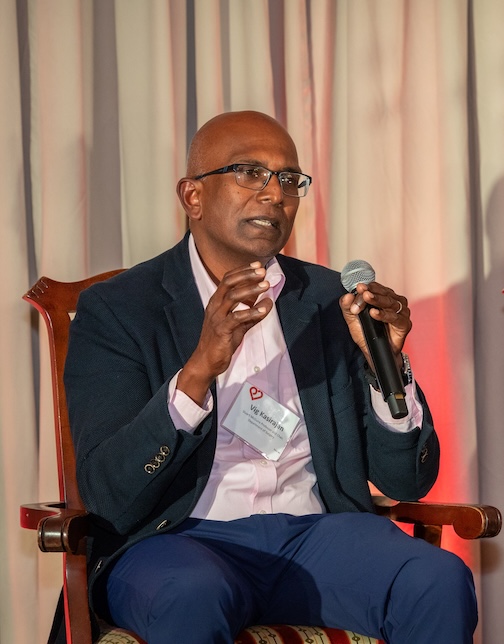 Vigneshwar Kasirajan, M.D., FACS, chair of VCU Health's Department of Surgery. (VCU Health Pauley Heart Center)
By 1996, Zeus was born. Made by Wang’s company, Computer Motion, Zeus was a laparoscopic instrument with a camera attachment. It was around that same time that VCU Health joined the robotic surgery game.
Vigneshwar Kasirajan, M.D., FACS, chair of VCU Health's Department of Surgery. (VCU Health Pauley Heart Center)
By 1996, Zeus was born. Made by Wang’s company, Computer Motion, Zeus was a laparoscopic instrument with a camera attachment. It was around that same time that VCU Health joined the robotic surgery game.
“We had a large grant from NASA at that time to look at robotics, train people, and perform surgery,” said Vigneshwar Kasirajan, M.D., FACS, chair of the Department of Surgery for VCU Health.
To simply say that VCU Health was a pioneer in the robotic surgery space would be a bold claim. However, Kasirajan has been here since the beginning and remembers it all.
But he isn’t focused on history. He’s ready to talk about the future.
VCU Health has made major investments in robotics and continues to grow. Right now, there are robotic surgical suites at VCU Medical Center, Children’s Hospital of Richmond at VCU, Short Pump Ambulatory Surgical Center and VCU Health Community Memorial Hospital.
VCU Health News spoke with Kasirajan about robotics, the future and how it provides patients with the best gift of all – getting back to a healthy life faster, with less pain and closer to home.
What is robotic surgery?
Robotics, in its basic form, is a very advanced minimally invasive surgery, a procedure that involves small incisions, as opposed to the large cuts of traditional surgery. Those incisions allow a surgeon’s tools to be inserted into the area where surgery needs to take place. By introducing robotic technology, patients avoid the often-traumatic side effects of a major incision, including pain and blood loss. It also minimizes future complications from a large incision.
The other major advantages include quicker recovery and release from the hospital. In some instances, patients may even go home on the same day.
Is there a surgeon involved in robotic surgery?
Yes. The surgeon is in constant control of the robot. However, the robot allows the surgeon access to very advanced 3D imaging, as well as the ability to manipulate tissue with freedom of motion. The natural tremors of a surgeon are eliminated, providing greater precision. It's a major advancement in modern surgery.
The da Vinci Surgical System provides magnification of up to 10 times the human eye, pinpointing accuracy and stability in moving tissue and making incisions. (Enterprise Marketing and Communications)
What types of surgeries use this technology?
Urology and gynecology have been using robotic surgery techniques for many years. Today, we are beginning to use this technology in more complex cases. In early 2025, surgeons from VCU Health Hume-Lee Transplant Center were the first in the country to perform a full robotic living donor liver transplant.
Additionally, patients who need kidney transplants often have challenging conditions. Making a large incision to put a kidney in can lead to problems with the incisions themselves, leading to long hospital stays. Hume-Lee Transplant Center is one of the first in the country to offer fully robotic kidney implantation, including the intricate and delicate technique of reattaching blood vessels from the donor kidney to the patient to restore blood flow.
Additionally, thanks to VCU Health’s investment in this technology, we use robotic surgery in many of our complex clinical program areas. They include oncology and thoracic surgery. While complex, they allow patients to recover faster with a better quality of life.
How is VCU Health expanding access to robotic surgery for its patients?
We are able to offer robotic surgery to patients at the Short Pump Ambulatory Surgery Center (ASC) in Henrico County and at VCU Health Community Memorial Hospital (CMH) in South Hill. This allows our patients to be treated closer to home and helps them avoid traveling to downtown Richmond. The robot at Short Pump ASC allows certain procedures to be performed safely in an outpatient environment. This includes many gynecological and urological conditions, including resections of the prostate and parts of other organs.
At CMH, we have specifically hired surgeons who are experts in robotic surgery. In the next year, we are going to see a massive expansion of robotic capabilities that benefit our patients in South Hill and the surrounding rural communities.
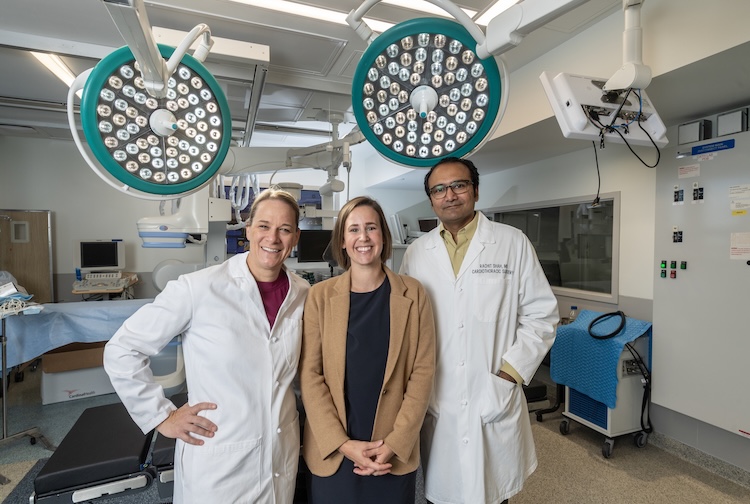 Left to right: Katherine Czyszczon, M.D., Nicole Wieghard, M.D., and Rachit Shah, M.D., are surgeons at VCU Health who use the da Vinci Surgical System. (Allen Jones, Enterprise Marketing and Communications)
Left to right: Katherine Czyszczon, M.D., Nicole Wieghard, M.D., and Rachit Shah, M.D., are surgeons at VCU Health who use the da Vinci Surgical System. (Allen Jones, Enterprise Marketing and Communications)
What does the future of robotic surgery look like for VCU Health?
A high priority for the Department of Surgery and VCU Health is to train future generations with this technology. We will soon develop a curriculum for our nurses and surgical technicians who work in the operating room so that our workforce is trained in these new techniques. Recently, we placed a fully robotic simulator in Virginia Commonwealth University School of Medicine's Christine B. and David E. Cottrell Surgical Innovation Suite to start this training.
Further, the health system and Intuitive, the robot manufacturer, are working together to increase access to training for our current physicians, residents, O.R. teams, as well as physicians from the community and around the country. This is very important because if we don’t disseminate knowledge, patients cannot benefit beyond our region.
As a university-based health system, our mission involves not just excellent patient care, but also education and research. Not only do we develop techniques to train people in delivering the best care – we also have the resources to understand the future of robotics. What is it going to look like ten years from now? What are the new techniques we could use beyond just surgery? Could we develop better imaging techniques so we can visualize blood flow to tumors? I think that opportunities are endless at VCU Health.
Leading surgical care, with compassion. Learn about our surgical specialties at VCU Health.
Inspired by this story? Read more about our patients and providers.


